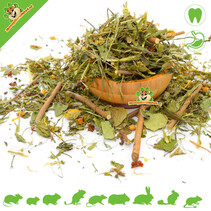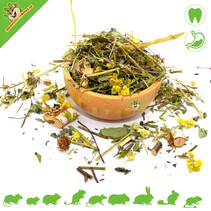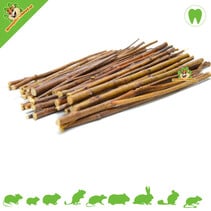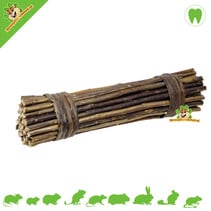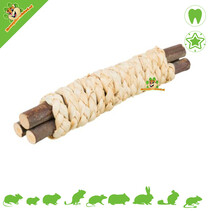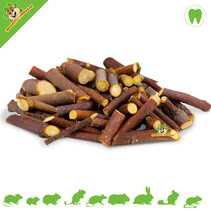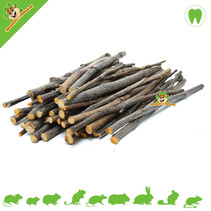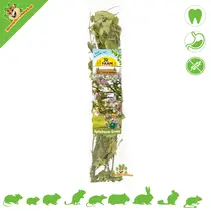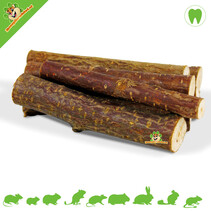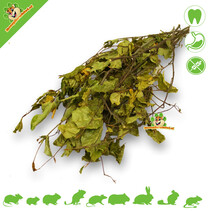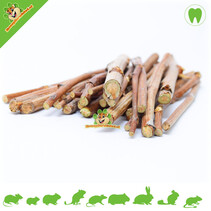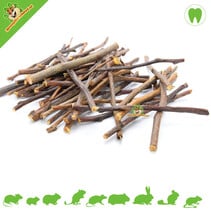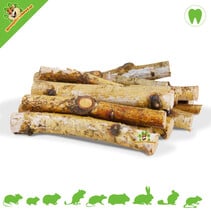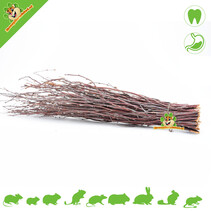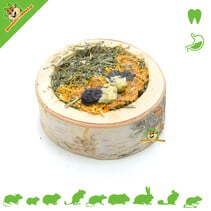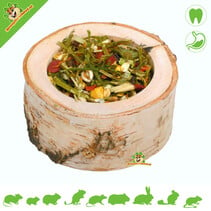Gerbil gnawing material | Natural gnawing wood for gerbils in the Gerbil Webshop
- Ordered before 5 p.m., shipped the same day!
- Al 14 jaar een begrip!
- Delivery from our own stock
- Ordered before 5 p.m., shipped the same day!
- Al 14 jaar een begrip!
- Delivery from our own stock

You can easily and quickly buy gerbil gnawing material at DRD Rodent Shop ® The Gerbil Webshop for your Gerbils!
Gerbils have a natural need to gnaw. This is because Gerbils are rodents and have continuously growing incisors. It is therefore necessary for Gerbils to be able to gnaw on something to wear down their teeth. If Gerbils have too few opportunities to wear down their teeth, the teeth can become too long or grow crooked with all the consequences that entails.
Rodents use gnawing wood to wear down their teeth. Because rodents' teeth are always growing, they need to have something to gnaw on regularly so that they don't grow too long and crooked.
Do Gerbils Gnaw a Lot?
With many rodents you see a difference in gnawing activity, that is not really the case with gerbils. These animals are really fond of gnawing and can therefore sometimes start gnawing on parts, which the owner is not so happy about. Because gerbils can gnaw really well, it is important that their enclosure is set up for this. Plastic edges will be gnawed away in no time. It is therefore wise to focus the attention of gerbils on the right gnawing material. Safe gnawing wood from willow, birch, lime, apple... etc. is ideal to give. The variation in thickness and structure is also very nice for the animals!
Why do gerbils need gnawing material?
Gerbils have continuously growing teeth. Without the opportunity to gnaw, the teeth can become too long, which can cause problems with eating. Gnawing material helps to keep the teeth at the right length in a natural way. In addition, it offers variety, challenge and enrichment in the cage.
How Fast Do Rodents and Rabbits' Teeth Grow?
Mice : About 0.3 millimeters per day
Hamsters : About 0.3 millimeters per day
Gerbils : About 0.4 millimeters per day
Rats : About 0.5 millimeters per day
Guinea pigs : About 2 to 3 millimeters per week
Rabbits : About 2 to 3 millimeters per week
Chinchillas : About 1.5 millimeters per week
Degus : About 1.5 millimeters per week
What do a Gerbil's teeth look like?
Let's take a look at the Gerbil from the dentist's chair, then we can note the following about the teeth:
-
Incisors (front teeth): Gerbils have two large, curved incisors on top and two on the bottom. These incisors grow continuously throughout their lives as they wear down from gnawing on food and other objects. The incisors are sharp and are used to cut and gnaw food.
-
Molars: Behind the incisors are the gerbil's molars. They have small, sharp molars in the upper and lower jaws. The molars are used to grind and crush food. Gerbils' molars also grow continuously to compensate for wear.
Which gnawing material is suitable for Gerbils?
For Gerbils we recommend safe gnawing material such as gnawing wood or gnawing stones made of natural materials such as loam or corn. The old-fashioned limestones are not suitable for Gerbils because they contain too many minerals that can settle in the bladder and kidneys. Gnawing stones enriched with sugar are also not suitable for Gerbils. A gnawing stone should have the purpose of wearing down the teeth. The animal should gnaw on gnawing material when it feels the need to gnaw and not because it is tasty because of a flavour. Of course, a gnawing stick can also be given as a change, but that is more of a snack than gnawing material.
Gerbils like hard, safe natural gnawing wood. Good choices include:
- Willow branches (such as Willow branches long or Willow branches 18 cm)
- Apple branches (such as Apple Branches 200 grams or Nibble Gnawing Wood Apple Tree)
- Hazelnut branches (such as Hazelnut Harvest or Hazelnut with Clover)
- Birch wood (such as Birch discs or Birch Nibble Broom)
- Herb mixes with twigs (such as Herbs & Twigs Mix or Denta Birch Mix)
All of these types are safe, natural and fit well with the natural gnawing needs of the Mongolian gerbil.
Which types of wood are suitable for Gerbils?
Rodent wood is the healthiest and most natural choice for Gerbils, but not all types of wood are suitable for these animals. The following types of wood can be used safely.
- Untreated fruit tree wood: Apple, pear, cherry and birch wood are safe choices
- Untreated Willow Wood: Willow wood is a popular choice for gnawing material for rodents, including gerbils. They often enjoy gnawing on willow branches
- Untreated Hazelnut Wood: Hazelnut branches can also serve as safe gnawing material for gerbils
- Untreated lime wood: Very popular with gerbils
- Untreated Beech Wood: Is strong and durable, making it a good choice as a gerbil gnawing material. It offers resistance to the gerbils gnawing, allowing them to wear down their teeth effectively.
It is not wise to take these types of wood from nature yourself. The wood used in our products is grown in our own orchards and cleaned, so that it is suitable for animal consumption.
An Overview of Our Rodent Wood Varieties
-
Linden: Loved for its soft texture and flavor, Linden offers a pleasant chewing experience for Gerbils. Linden wood is known for its soft and light texture. It offers a mild gnawing sensation, making it suitable for all Gerbils who enjoy softer materials. Linden wood has a light and mild flavor, making it attractive to animals without a strong preference.
-
Willow: With its crispy bark and juicy interior, Willow is a favorite choice for Gerbils who like to actively gnaw. Willow wood has a crispy bark and a soft core. It offers a varied texture that the animals can appreciate. Willow wood has a natural and light flavor, which makes it attractive to gnawing Gerbils.
-
Hazelnut: Hazelnut gnawing wood combines strength with taste, making it a sustainable and tasty choice for your gnawing friends. Hazelnut wood has a firm texture. It offers good resistance for Gerbils who like to actively gnaw. Hazelnut wood has a characteristic taste that Gerbils can appreciate.
- Apple: Apple wood is a popular choice for gerbils as a gnawing material. Apple wood generally has a medium texture. It offers satisfying resistance when gnawing, which is ideal for animals that like to actively grind their teeth. Apple wood also has a mild and pleasant flavor. This subtle flavor can pique the curiosity of gerbils, which makes them want to gnaw on the wood.
-
Birch: The light and airy nature of Birch makes it a versatile choice, perfect for Gerbils with different gnawing preferences. Birch wood has a light and airy texture. It is suitable for animals that prefer slightly less dense materials. Birch wood has a mild flavor, making it a versatile choice for different Gerbils.
-
Beech: With its sturdy structure, Beech offers a long-lasting chewing challenge for Gerbils who like to be challenged. Beech wood has a sturdy and durable texture. It offers long-lasting gnawing pleasure and is suitable for animals who like a challenge. Beech wood has a neutral taste, which makes it attractive to animals without a pronounced preference.
- Coffeewood : Coffeewood, made from coffee plants and generally has a soft and smooth texture which is very interesting for Gerbils. The taste of Coffeewood is a natural, earthy taste. Gerbils can certainly appreciate this taste while gnawing. Coffeewood is also known for its durability, it lasts a long time as gnawing material.
-
Wood and Herb Branches: For animals that enjoy a tasty variety, wood and herb branches offer a combination of gnawing pleasure and aroma.
How do you use gnawing wood for gerbils?
-
Placement in the enclosure: Simply place the gnawing wood in your animals' enclosure. They will instinctively nibble on it when the need to gnaw arises.
-
Durability: Rodent wood is long-lasting and does not need to be replaced every time the enclosure is cleaned. Only wet rodent wood needs to be removed to prevent mold.
Rodent Wood from the Garden or Picked Outside?
We strongly advise against picking gnawing wood from the garden or outside. Our gnawing wood is harvested and cleaned under protected conditions, making it free of possible parasites and contaminants that can occur in nature. Using our carefully selected gnawing wood ensures a safe and healthy gnawing experience for your animals.
Are herbal mixes with gnawing material safe for gerbils?
Yes! As long as they are made from unsprayed and gerbil-friendly plants and herbs, they are ideal. Think of the Herb Denta Mix , Herb & Twig Mix or Birch Pizza with Herbs & Flowers . These combine taste, smell and gnawing pleasure.
How often should I offer gnawing material?
It is best to offer gnawing material in your gerbils' enclosure at all times . Gerbils like to gnaw throughout the day, especially in the evening and at night. Regularly alternate between branches, roots and herbs to keep things interesting.
What is the difference between gnawing wood, roots and herb mixes?
- Gnawing wood : Hard material for long-term gnawing and dental care.
- Roots (such as Dandelion Root or Jerusalem Artichoke): Tasty, slightly softer, ideal for extra variety.
- Herb mixes with sprigs : Fragrant, tasty and good for gnawing pleasure and enrichment.
These three categories complement each other perfectly.
What are popular combinations for gerbils?
A good mix for gerbils consists of, for example:
- Willow Branches + Apple Branches + Birch Pizza
- Gnawing box Delicious gnawing wood + Denta Mix + Jerusalem artichoke sticks
- Hazelnut branches + Gnawing root + Lucerne sticks
This way you offer challenge and care at the same time!
My gerbil doesn't chew on the material, what now?
Some gerbils have preferences. Try different types of wood and add scented herbs to make it more appealing. It can also help to offer the material in different places in the enclosure.
Are gnawing stones or mineral blocks necessary?
These are not suitable for gerbils. Natural gnawing materials such as wood and roots are better suited to their needs. Avoid products with added sugars, honey or colourings.
Order Now and Let Your Gerbils Enjoy Natural Gnawing Fun!
Give your Gerbils the gifts of nature with our diverse range of gnawing wood. Order today and watch your Gerbils enjoy the gnawing adventure!
Can gnawing materials prevent problem behavior in Gerbils?
Gerbils really like to gnaw and they do this on almost everything. However, offering sufficient gnawing material can prevent problem behavior. If the animals can gnaw on gnawing material, they will be more likely to leave other parts of the enclosure alone. Gnawing wood fulfills the following functions:
-
Wearing down teeth: Rodents, including gerbils, have constantly growing teeth. By gnawing on wood, they can keep their teeth at the right length and prevent excessive tooth growth. This reduces the chance of dental problems, such as teeth that are too long or crooked, which can cause pain and discomfort.
-
Stress Relief: Gnawing activity helps rodents burn off excess energy and reduce stress. It keeps them occupied and distracted, which helps them become less bored and less likely to engage in destructive behavior, such as chewing on cage components or themselves.
-
Enrichment: Providing gerbils with gnawing wood in their enclosure provides enrichment and stimulation. It allows them to indulge their natural gnawing instincts and explore their environment. This helps to promote gerbils’ mental health and provides them with an active and challenging living environment.
It is important to provide sufficient gnawing material in the form of safe wood, such as beech, lime, willow, etc. This allows gerbils to fulfil their gnawing needs and reduces the chance of problem behaviour.
What are the symptoms of dental problems in Gerbils?
Dental problems can manifest themselves in different ways in gerbils and therefore show different symptoms. It is very important to perform a periodic health check on the animals and to recognize these symptoms so that you can intervene quickly. Some symptoms of dental problems in gerbils include:
-
Decreased appetite: If a gerbil has problems with his teeth, he may have difficulty eating. He may eat less food or be more selective in what he eats. This can lead to weight loss and general weakness.
-
Changed Chewing Behavior: Watch for changes in your gerbil's chewing behavior. If he is chewing on one side of his mouth, dropping food from his mouth, or constantly moving his mouth as if in pain, this could be a sign of dental problems.
-
Excessive salivation: Dental problems can cause excessive salivation in gerbils. If you notice that the fur around your gerbil's mouth is moist or sticky, this could indicate salivation problems due to dental problems.
-
Changes in tooth length: In healthy gerbils, the upper and lower incisors should meet and wear down properly. If you notice your gerbil's teeth growing too long or crooked, this could be a sign of dental problems.
-
Decreased activity or lethargy: Gerbils with dental problems may feel less active and may show signs of lethargy. They may withdraw from normal activities and show less interest in their surroundings.
If you notice any of these symptoms in your gerbil, it is advisable to consult a veterinarian who has experience with rodents as soon as possible. Dental problems in gerbils can be painful and can affect the health and well-being of your gerbil, so early diagnosis and treatment are essential.
What to do about dental problems in Gerbils?
If you notice that your gerbil's incisors are getting too long or if your gerbil is having trouble eating or chewing, it is advisable to consult a veterinarian. A veterinarian can check your gerbil's teeth and shorten them if necessary to maintain the gerbil's health and well-being.




